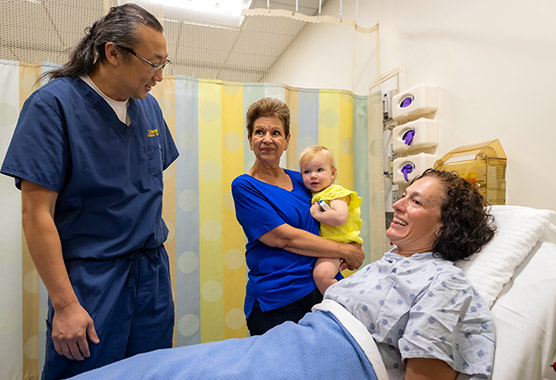About Your Stay
We’re proud to offer you and your loved ones the expertise and resources of our region’s only nationally ranked academic health center.

About Your Stay
Information for Patients
Staying at UC Davis Medical Center means you’re getting care from one of the nation’s leading academic medical centers. Our experts provide you with the experience, skill and compassion to treat even the most complex medical problems.
UC Davis Medical Center is part of UC Davis Health and collaborates with the UC Davis School of Medicine and the Betty Irene Moore School of Nursing at UC Davis. The medical center is home to more than 700 specialists trained in more than 150 medical fields.
Your safety and health are important to us, and we strive to make your stay as comfortable as possible. You can feel confident that our expert medical and support staff are here for you.
This section of our website gives you information about what to expect when you’re an overnight patient (known as an “inpatient”) here.
Bring to admissions office check-in:
- Insurance card
- Identification
- Co-pay or deductible, if applicable. (We may contact you ahead of time to discuss payment arrangements if your insurance indicates a payment will be due).
Bring to your hospital room:
- Clothing (such as sleepwear and slippers)
- Personal health care equipment (such as crutches, prosthetics, C-pap machine, hearing aids, eyeglasses or dentures)
- Preferred toiletries (some toiletries are provided to you – see below)
Bring for your health care team and family caregivers:
- Living will/durable power of attorney for health care forms, if you have them
- Medications list, with dosages (including supplements and herbals)
- Any physicians’ orders and preadmission paperwork provided to you before admission
Leave at home or with a friend or family member:
- Electronic devices, such as radios and hairdryers, which can be a safety hazard
- Jewelry
- Keys
The hospital is not responsible for lost or stolen items, including cellular devices, laptops, or tablets
Find in your room:
We provide you with a kit that includes:
- A wash basin
- Facial tissue
- Soap and soap dish
- Toothbrush and toothpaste
- Comb
- Hand lotion
- Water pitcher and a plastic tote bag
You may ask for other personal-care items such as a shaving kit, mouthwash, mirror, conditioner and powder.
We want you to take an active role in your safety. Your caregivers will ask you for your name and birthday every time they care for you. We do this to make sure you have a safe outcome.
Please review the below hospital safety policies. Talk to your doctor or nurse if you have any questions.
- All employees who come into contact with you should be wearing a photo identification badge with their name and job title. Feel free to ask to see the badge if it is not visible.
- Tell the staff about any medications you are taking. This includes:
- prescriptions
- over-the-counter medications
- vitamins
- herbals
- Tell your physician and health care staff about allergies to:
- food
- latex
- medications
- any other allergies you may have.
Patients with medication allergies are given a red wristband.
- Please wear your patient identification wristband at all times. Check to see that your name is spelled correctly. Hospital employees should always call you by your correct name.
We are committed to providing safe, high-quality care.
We encourage patients to “speak up” anytime with questions and concerns.
If you have any questions, concerns or special requests while in the hospital, we encourage you to speak with:
- your nurse
- other members of your health care team, or
- the manager of the unit where you are staying
Learn more about communicating with your providers
If you need additional assistance, two other options are:
- The Code Help hotline, a special phone number for urgent matters. The welcome booklet you received upon admission to the hospital contains Code Help information.
- The staff in our Patient Relations Department, here to serve as liaisons between our patients, families, and their health care providers.

